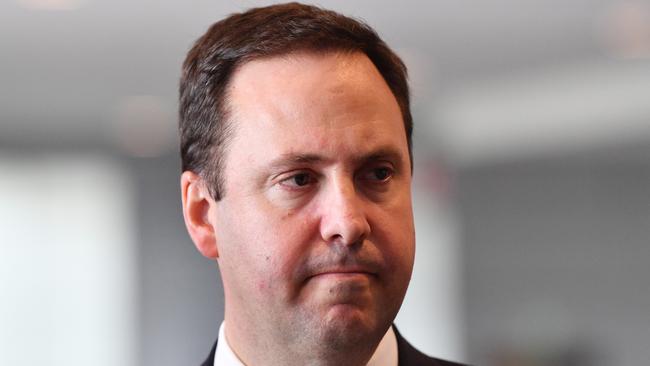Steven Ciobo commits to UK trade despite Brexit turmoil
Steven Ciobo says Australia will continue to work to open up more trade opportunities with the UK, despite Brexit turmoil.

Trade Minister Steven Ciobo says Australia will continue to work to open up more trade opportunities with the UK, despite turmoil over Brexit.
Overnight the May government narrowly survived an attempt by pro-EU Conservative MPs to have the UK join a customs union if it does not agree to a free-trade deal with the EU.
The May government, which says a customs union would stop it striking new trade deals, won 307 votes to 301.
Mr Ciobo, who is in London for talks with his UK counterpart Liam Fox said he was “concerned but not alarmed” about trade wars spiralling out of control as the UK battles to implement Brexit and US President Donald Trump pursues a protectionist agenda.
“The fact is that of course we need to be vigilant in terms of watching conditions on the trade front. Australia is a trading nation, but this is precisely the reason why the Turnbull Coalition government is focused very strongly on opening up market opportunities,” Mr Ciobo told ABC radio.
“We did that of course most recently in terms of the comprehensive TPP11. This has opened up a lot of new market export opportunities for Australian producers, and that’s great news in terms of helping to ensure that we have a more diversified approach when it comes to trade, which helps us safeguard out economic growth and our jobs.
“It’s been the Turnbull Coalition that’s delivered the exemption for Australian steel and aluminium with the Trump administration. It’s been the Turnbull Coalition that pressed on with the TPP11 even when the Labor Party said that we should be retreating and in fact Bill Shorten described it as a ‘vanity project’.
“It’s been the Coalition that’s delivered of course free trade agreements with Japan, with China and with South Korea, and as you know I’m pursuing the most ambitious trade agenda in Australia’s history.
“We have trade agreements underway with Indonesia, Hong Kong, Pacific Alliance countries, the Regional Comprehensive Economic Partnership, we’ve commenced negotiations with the EU, shortly we’ll commence negotiations with the UK and with India, so it just speaks to a very full dance card which is all about diversification.”
Mr Ciobo met with his UK counterpart Liam Fox overnight.
“We had a very good discussion and both of us remain absolutely committed to a comprehensive, high quality FTA between the UK and Australia,” he said.
“That has been our focus and in fact that’s the reason why Australia was the first country with which the UK formed a working group to deliver precisely upon this ambition, so we remain steadfastly committed to working through that process, but obviously and understandably the UK’s Number One priority is the arrangements that they will have formally exiting the EU, so we’ve got to let that work that through before we’re able comprehensively delve into our negotiations.”
Asked whether a “softer” Brexit of the kind being pursued by Prime Minister Theresa May would make it harder for Australia to reach an optimal free trade agreement with the UK, Mr Ciobo said he was not interested in “crystal ball-gazing”.
“My focus is on dealing with the lay of the land. That’s why I was over here speaking with Secretary Fox, my counterpart.
“It’s precisely the reason why I’m looking very closely at the language, but I think we need to be realistic. It is perfectly understandable that the UK is going to seek to do the best deal they can with the EU.
“It’s a massive market right on their doorstop, and realistically that is going to preoccupy their focus and attention.
“Once they work out ultimately what that shape will be, that is then when Australia can engage in a substantive way, in a comprehensive way, beyond the sort of scoping that we’ve been having, the ambition discussions that we’ve been having so far.”
Mr Ciobo said people should not presume that trade negotiations were a “zero-sum” game.
“They think if one side wins in one area, then the other side must lose in that area, and that’s simply not what a good trade deal is about,” he said.
“A good trade deal means that we have better market access to each other’s markets, that boosts our opportunity to drive goods exports, it boosts our opportunity with respect to services exports, and it boosts opportunity for investment into each other’s economies, which helps to drive economic growth and employment.”






To join the conversation, please log in. Don't have an account? Register
Join the conversation, you are commenting as Logout